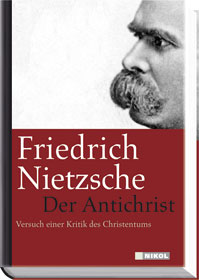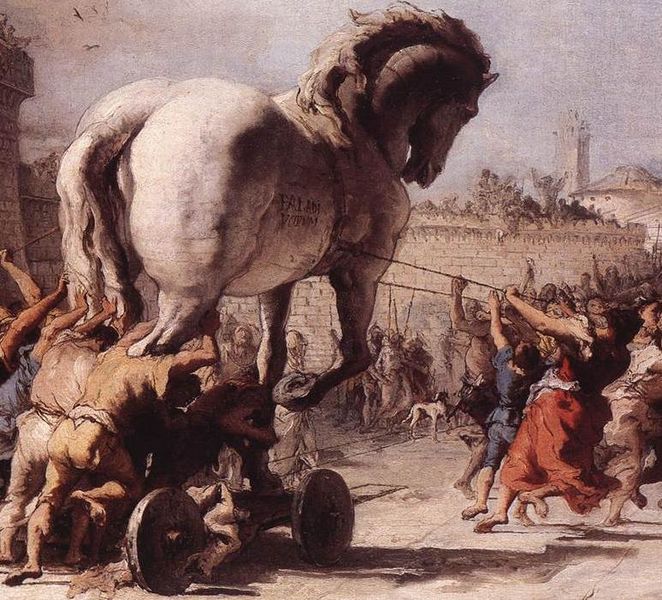Or:
The Jesus Seminar’s red letters
 I have read The Five Gospels (pic left). It has bold letters in black (words attributed by the evangelist to Jesus but not of Jesus), letters in gray (ideas that might or might not come from the historical Jesus), letters in pink (ideas that could have come from the historical Jesus), and red letters (words that, according to the authors, probably were used by the historical Jesus).
I have read The Five Gospels (pic left). It has bold letters in black (words attributed by the evangelist to Jesus but not of Jesus), letters in gray (ideas that might or might not come from the historical Jesus), letters in pink (ideas that could have come from the historical Jesus), and red letters (words that, according to the authors, probably were used by the historical Jesus).
The book was published by the Jesus Seminar, a group of professional exegetes of the New Testament. The Seminar was founded by the academic Robert W. Funk (1926-2005). It is interesting that the book puts almost all the gospel of John in black and gray print. That is to say, the consensus in New Testament scholarship is that very few actual Jesus words found their way in the fourth gospel. As a reviewer put it:
Funk… said that, in all, 31 sayings in the four biblical Gospels and several apocryphal sources fell into the “red” category of authentic sayings (only 15 of which are actually different, due to parallel versions in more than one gospel). They included the good Samaritan and mustard seed parables, the advice to love your enemies and some Sermon on the Mount pronouncements such as, “Blessed are you poor, for you shall inherit the kingdom of God.”
Another 200 sayings were accorded pink votes, meaning that Jesus said something similar to the recorded words. Together, the red and pink sayings constituted about 20% of the total; another 30% fell into the gray class. “A gray vote meant that some of the ideas may have gone back to Jesus, but not those words,” Funk said.
I am sceptical of the Jesus Seminar. I agree with Joseph Hoffman’s comparison of the Seminar with a talking doll: “The Jesus of the [Jesus] Project is a talking doll with a questionable repertoire of thirty-one sayings. Pull a string and he blesses the poor.” Nevertheless, the main product of the Jesus Seminar, The Five Gospels, is a gem to understand the zeitgeist that is destroying the white race.
Pay attention to the subtitle of this site, ‘Love is murdering the white race’, a quotation from what Alex Linder wrote not long ago in Gab (I believe that out-group altruism, ultimately inspired in the words of Jesus, is destroying the Aryan DNA). Why not quote those verses in red and some pages of the book’s introduction to illustrate my point? Keep in mind that the liberal scholars of the Jesus Project, well versed in the Greek language, did not actually break away from Christian ethics that, according to the Führer, has taken mankind a giant step backwards.
In the Preface the authors explain: ‘The Five Gospels has many authors. It is the collective report of gospel scholars’ that ‘produced a translation of all the gospels known as the Scholars Version. And finally, they studied, debated, and voted for each of the more than 1,500 sayings of Jesus in the inventory’. A few pages ahead, in the introduction, these scholars say, ‘among the reasons for a fresh translation is the discovery of the Gospel of Thomas’. However, in this blog post I’ll concrete myself to quote the ‘talking doll’ sayings of the canonical gospels, omitting both the Gospel of Thomas which has some verses in pink and red, and the Gospel of John which has none in red.
It’s very refreshing to read a translation that employs colloquialisms. Unlike the Shakespearian King James Bible, the Mark gospel is very colloquial in the original Greek. For instance, in the Scholars Version, when the leper comes up to Jesus and says, ‘If you want to, you can make me clean’, Jesus replies, ‘Okay—you’re clean!’ Also, the term ‘Kingdom of God’ in most Bibles is translated from the original Greek as ‘God’s imperial rule’. I agree on this point with the Jesus Seminar, as even the New Revised Standard Version of the Bible strikes the ear ‘as faintly Victorian’, not fully vernacular. Moreover, in the Scholars Version, which is free of ecclesiastical control, the term ‘son’ is not capitalised when referring to Jesus.
Because New Testament scholars believe the Gospel of Mark was written first, they placed it first among The Five Gospels (red colour means that the colour actually appears in this 553-page book):
Pay the emperor what belongs to the emperor, and God what belongs to God! (Mark 12: 17).
The scholars also used red letters in the parallel Matthew and Luke quotations of the above saying.
Don’t react violently against the one who is evil: when someone slaps you on the right cheek, turn the other as well. When someone wants to sue you for your shirt, let that person have your coat along with it. Further, when anyone conscripts you for one mile, go an extra mile. Give to the one who begs from you… Love your enemies (Mark 5: 39-43).
This is what is murdering whites. Non-whites don’t believe such nonsense. But nowadays even the staunchest atheists unconsciously subscribe these words of Jesus. On page 143 of the book the words ‘Our Father’ appear in red. The next words is red appear fifty pages later:
Heaven’s imperial rule is like leaven which a woman took and concealed in fifty pounds of flour until it was all leavened (Matthew 13: 33).
The Parable of the Leaven appears in Matthew and Luke. In both places it immediately follows the Parable of the Mustard Seed. In Heisman’s Suicide Note it was interpreted thus: ‘In Jesus’s parable, it was the way of the Kingdom of God: a dangerous, pungent shrub with fiery effect that takes over where it is not wanted. Love was not only beneficial, but also necessary, to the health of the Roman patriarchal-imperial order. However, too much of a good thing can become absolutely deadly if not controlled within proscribed bounds’. Incidentally, this late Jew, Heisman, seemed to harbour a morbid pleasure on the subject of how the Jews infected whites with ethnosuicidal ethics.
I won’t quote the next words in red, thirty pages later, because it is the entire Parable of the Vineyard Labourers (Matthew 20: 1-15): too long for this blog entry. But let’s quote the next red letters that appear in the Gospel of Luke (6: 20-21):
Congratulations, you poor!
God’s domain belongs to you.
Congratulations, you hungry!
You will have a feast.
Congratulations, you who weep now!
You will laugh.
A couple of pages ahead we see again in red ‘love your enemies’ and in the same Luke chapter, another quote of that we have seen above:
When someone strikes you on the cheek, offer the other as well. When someone takes away your coat, don’t prevent that person from taking your shirt along with it. Give to everyone who begs from you (Luke 6: 29-30).
Again, I won’t quote page 323 even though the long Parable of the Samaritan appears in red. But this unquoted parable is the perfect example of out-group altruism—and the exact opposite of in-group altruism in the Old Testament! (Remember the Bible in a nutshell: Ethnocentrism for me but universalism for thee.) Twenty pages ahead we see once more the Parable of the Leaven in red, but this time it’s the Luke version of it. On pages 357-58 we see, all in red, most of the Parable of the Shrewd Manager (Luke 16: 1-8) that I won’t reproduce here either to keep the entry short.
My two cents. As to the hypothesis if the actual words of Jesus are retrievable or not it’s irrelevant who’s right: Hoffmann or the Jesus Seminar. What matters is that whites have been programmed, by Christianity, to commit ethnosuicide. To me, these words in red, whoever they came from—a Jew named Jesus or a Semitic evangelist—beautifully depict the Western zeitgeist.
Love is murdering the white race.













